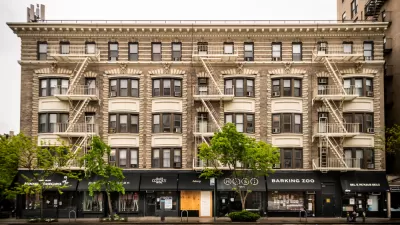Larry Kosmont shares what cities need to do to meet escalating state requirements; add housing density; fix shopping centers; replace sales tax; pay for constituent services; plan for the future; and capture value created by economic restructuring.

California cities are currently being challenged to respond creatively to "post-COVID" development trends and new state housing policies. To constructively contribute to the obvious need for a local mind-reset, VX News sat down with Larry Kosmont to afford him an opportunity to speak on what cities need to do to in order to capture value from this changing economy and how to do this to increase the housing stock and improve livability across California.
Kosmont goes into some of the clever ways cities can use existing zoning and tax measures to get additional funding and support from developers to get more housing and improve density, but also to get support for open spaces, transit infrastructure, and more. He explains how this "carrot" approach can be a win-win for cities to get more investment into projects they need done and developers can have certainty knowing the areas they are putting these projects will see continued investment by the city. One of the tools that he recommends for this process is the creation of Enhanced Infrastructure Financing Districts (EIFDs).
At the end of the interview, Kosmont takes some time to go through his thoughts on some recent California housing policy topics such as the Surplus Land Act, state intervention in the creation of more housing, and the future of local economic development. He discusses the way in which, by complicated means, the Surplus Land Act is allowing cities to go through their assets and really assess what they do and do not need. At the end of the day, he sees the best way for creating new development and helping the crisis as being through local cooperation with private developers to get housing actually completed and on the market.
You can find the full interview here.

Alabama: Trump Terminates Settlements for Black Communities Harmed By Raw Sewage
Trump deemed the landmark civil rights agreement “illegal DEI and environmental justice policy.”

Study: Maui’s Plan to Convert Vacation Rentals to Long-Term Housing Could Cause Nearly $1 Billion Economic Loss
The plan would reduce visitor accommodation by 25% resulting in 1,900 jobs lost.

Planetizen Federal Action Tracker
A weekly monitor of how Trump’s orders and actions are impacting planners and planning in America.

Wind Energy on the Rise Despite Federal Policy Reversal
The Trump administration is revoking federal support for renewable energy, but demand for new projects continues unabated.

Passengers Flock to Caltrain After Electrification
The new electric trains are running faster and more reliably, leading to strong ridership growth on the Bay Area rail system.

Texas Churches Rally Behind ‘Yes in God’s Back Yard’ Legislation
Religious leaders want the state to reduce zoning regulations to streamline leasing church-owned land to housing developers.
Urban Design for Planners 1: Software Tools
This six-course series explores essential urban design concepts using open source software and equips planners with the tools they need to participate fully in the urban design process.
Planning for Universal Design
Learn the tools for implementing Universal Design in planning regulations.
Caltrans
Smith Gee Studio
Institute for Housing and Urban Development Studies (IHS)
City of Grandview
Harvard GSD Executive Education
Toledo-Lucas County Plan Commissions
Salt Lake City
NYU Wagner Graduate School of Public Service





























